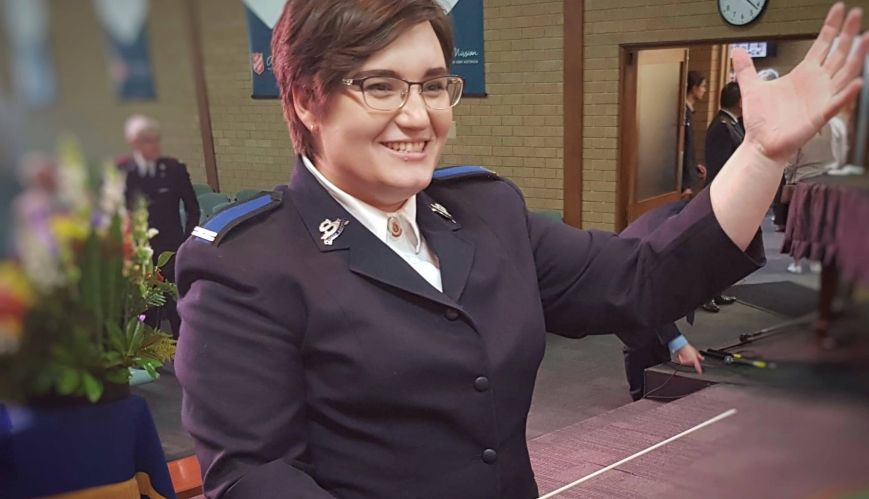Bandmaster Britteny flying the flag for women

Bandmaster Britteny flying the flag for women
19 October 2018
Britteny Ling is bandmaster at The Salvation Army’s South Barwon Corps in Victoria.
She’s been playing music since she was five years old, and has played in a Salvation Army band since the age of eight. Others asked South Barwon Salvation Army bandmaster, Britteny Ling, what music means to her and how it feels being one of the few female Salvation Army bandmasters in Australia and the world.
Others: When did you start playing an instrument?
Britteny: I was five when I started piano. When I was seven or eight The Salvation Army ran a school of performing arts, which I went to. I learned my instrument from Sarah Nottle. She played the French horn and taught me how to play the cornet. When that finished I went to the bandmaster at Werribee Corps and said, “I’m pretty good now, can I play in the band?”. So I think I was eight when I joined the band.
Others: Why did you want to be a bandmaster?
Britteny: I wanted to be in front of the band when I was younger, but as I got older it got more about creating good music and being able to influence what happens in the band. I like music and I like hearing the bands play so it just felt natural. My first time conducting was when I was 15 with the Werribee Concert Band, which is a community concert band. It was my first big experience and I’m pretty sure I conducted the wrong way around, but the musical director was very patient and very encouraging! I was the Assistant Musical Director for that band from age 16 to 20. And at the beginning of 2017 I became bandmaster of my corps band.
I’m really inspired by Captain Ruby Baker who led the Austral Lasses’ Band in 1905-06. I have a photo of her and a little article about her pinned over my desk, given to me by one of the retired bandmasters from South Barwon. She was bandmaster at her corps at age 15, and held that position for about seven years before going to training college. Captain Baker took the Lasses’Band on a tour of Australia and New Zealand, “experiencing much financial and spiritual success as well as praise for the skill of both the band and its leader”. I think she’s the pioneer, and a testament to great leadership.
Others: What does the role mean to you?
Britteny: Being bandmaster is a lot of influence, and music is only a small part of it. You plan your rehearsals and you conduct your rehearsals wanting to play great music, but it is also, in The Salvation Army particularly, a whole lot more. You’ve got to know what the music is about, you’ve got to have it sorted spiritually yourself, to know what it means and to be able to influence that creation within the group. The highlights for me are often the devotions that we have in the middle. The band is a really caring community. People care about each other and pray for each other and it’s like the church in miniature, or maybe not even in miniature!
Others: How do you feel to be a female bandmaster when this role is mostly male dominated?
Britteny: Yes, I am a female and yes, I am a bandmaster, but I do want to make the distinction that I am a simply a ‘bandmaster’, not a ‘female bandmaster’. But I do feel a little bit in the minority. Outside of my own corps, it always surprises people to tell them, ‘Oh yeah, I’m the bandmaster at my corps.’I always get a look of puzzlement and shock. I know there are women’s bands around The Salvation Army world and there are other women conductors. At Peart Memorial Corps in Soweto [South Africa] they have a women conductor. At Kenya East they have a Territorial Women’s Band so there are women who want to do it and are capable of doing it. I don’t know why we don’t see them more. But I’m not doing it because I want to pioneer the way for women, I’m doing it because I love music and more women should be allowed to do this, too.
Others: Do you feel that The Salvation Army is genuinely moving towards gender equality?
Britteny: I think it’s moving way too slowly because it’s been on the agenda since the beginning. I know in some spheres there’s this goal of 30 per cent female representation. Why not 50 per cent? There are actually more women in the Army than there are men. For example, in South Barwon’s Just Brass program, I have about 60 per cent females. It’s 70/30 at Ringwood. It’s not that women or girls don’t want to do it, it’s just that there’s this culture in my age and older where women just weren’t given the opportunity. The whole “Boys go to band and girls go to timbrels”thing –I don’t know why that happened. So, I think [gender equity] is moving way too slow.
Others: How do you see music in The Salvation Army as a way of showing God’s love to others?
Britteny: Music transcends all languages, and that’s a clichéway to say that everybody speaks “music”. Sometimes, when you need that clarity and you need to reflect and you need to mediate on something, the music can do that. It’s this language without words that just speaks to you and communicates in a much deeper way. Sometimes we don’t have enough words to explain what we mean, but music actually takes you emotionally and spiritually to that place where you can explore your faith.
Others wishes to thank Captain Peter Hobbs for his assistance with this interview.